The following article is based on Joel Kaczynski's presentation at the 2018 Precision Farming Dealer Summit. To watch the presentation, click here.
As precision farming departments at farm equipment dealerships evolve, adding agronomic services has been somewhat of a natural progression. But, generating recurring revenue from agronomic services can be a challenge. There are a number of options to consider: hiring dedicated staff agronomists, partnering with local agronomists, training precision staff on agronomy, and any combination of the three.
However your dealership decides to structure agronomic services, you need to start deciding what fits your company culture best. “Everybody is unique in your dealership, in your customer base and what you need to do to really leverage that,” says Joel Kaczynski, product specialist manager for RDO Equipment. “We’ve focused on what the culture of our company is and how we got to where we are today and used that as the basis for how we structure our agronomists and our agronomy strategy.”
Agronomy Training for All
For RDO, the best strategy at this point has been to partner with an agronomist in each of its 3 regions (Midwest, Southwest and Northwest). And while they have dedicated agronomists working with their customers, the dealership has made it a priority that all employees on the ag side of the business have at least a basic understanding of agronomy. Employee training is one of the backbones to RDO’s success, and now included in that training is a web-based class that Kaczynski describes as Agronomy 101 and 102.
When agronomist Nate Dorsey was hired, the dealership’s agronomy training really took off. Dorsey created a training video using animation to highlight some of the aspects of agronomy, including the importance of understanding the difference between soil and dirt when talking with a farmer.
Field Trials
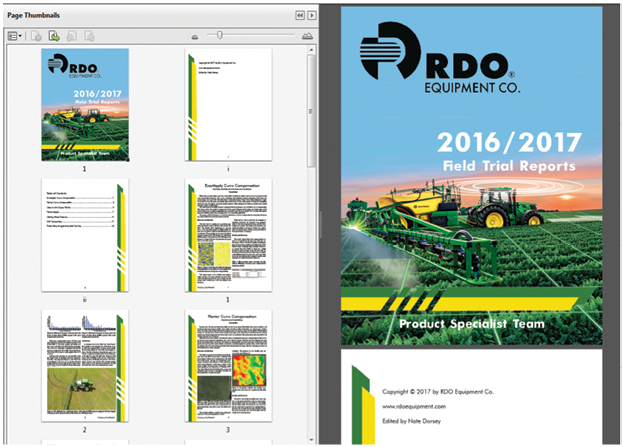
Each product specialist at RDO Equipment works with the agronomists on a field trial. The results are then pulled together to serve as training for all RDO employees to help prove ROI of a new technology for customers. Source: RDO Equipment
“It’s a half hour long presentation to listen to with a list of questions and tests at the end. Then we can qualify and quantify who has taken it. And then we also use it with onboarding new employees coming in,” Kaczynski explains.
Everyone goes through the training to help tie equipment to agronomy. “We want our employees to understand that even though they might not view themselves as experts, they’ll be more successful selling equipment if they can talk more intelligently and have a better understanding of what the technology in precision ag is doing and how it relates to growing crops and agronomy,” he says.
RDO doesn’t just focus on training its employees on agronomy though. The dealership is also active in educating its customers on the subject, much of it done through social media and podcasts. RDO product specialists are active on Twitter and the dealership also has posted videos on YouTube to help educate customers. In addition, the dealership hosts the Ag Technology podcast, which helps it extend beyond their regular customer base. All these different approaches are used to help educate people on how technology can be used alongside agronomy.
Working with Agronomists
Over the last year, RDO set a goal to have each product specialist work with the agronomists on a field trial. The agronomists and product specialists work together on the field trial and then pull the results together in a format that can be delivered to all RDO employees internally. The field trials are used to help prove ROI of a new technology to customers, Kaczynski says.
For example, RDO did a field trial on curve compensation on planters. “We did a curve and pulled the sample and identified and calculated out what our return on that would be looking at the outside rows compared to the inside rows with over populating it and under populating,” he says. “We wanted to give a customer an idea of what his ROI could be on curve compensation on a planter that transmitted into the sprayer as well with the new technology in the exact plots. I feel that it’s key for our customers for adoption with our field trials.”
The dealership works closely with local universities and technical colleges on the field trials. RDO is working with North Dakota State College of Science in Wapheton, N.D., on its 90-acre “Land Lab” program and providing equipment for the students. “There’s an opportunity for us to bring some of our equipment in there, hopefully use it for training internally, and also just to get the engagement of students and the people into the ag industry. That is key to the success of precision ag,” Kaczynski. “What we’re looking at today is to bring the knowledge, bring excitement of employees, of the youth into this industry and that’s what we’re trying to do when we’re collaborating with these colleges, and also help them understand what the latest technology that’s out there.”
Collaborating with Ag Service Providers
A few years ago RDO updated its proprietary CRM software to include a trusted advisor field. “We’re now documenting who our customer’s agronomist, banker or anyone else who is helping make a decision on that farm is, and that ties the agronomist to that customer. And some of those agronomists and trusted advisors work with multiple customers. We’re able to build relationships with trusted advisors, bringing them in for training, identify what software they’re using, and hopefully help them understand the John Deere system and bring them into that.”
CRM Software Integration
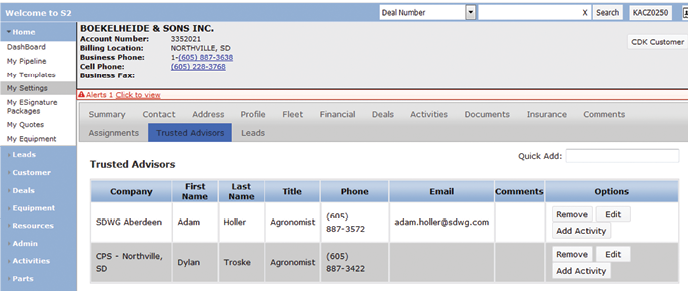
RDO Equipment added a “Trusted Advisor” field to its proprietary CRM software to document who its customers’ agronomists, banker or anyone else who is helping them make decisions on the farm. Source: RDO Equipment
Find Your Spot in the Market
One of the keys to figuring out how to best incorporate agronomy services into your dealership is to determine your place in the market, says Paul Bruns, owner of Precision Consulting Services. “There’s a lot of people in this industry who are awfully darn good on equipment. There’s also a lot of people in this industry who are really good at agronomy. And there’s a group that falls right in the middle there who are good at equipment and agronomy. Then we have people who are good at software and data services. Some of them understand agronomy, some of them understand equipment,” he says.
How to Find Your Place in the Market
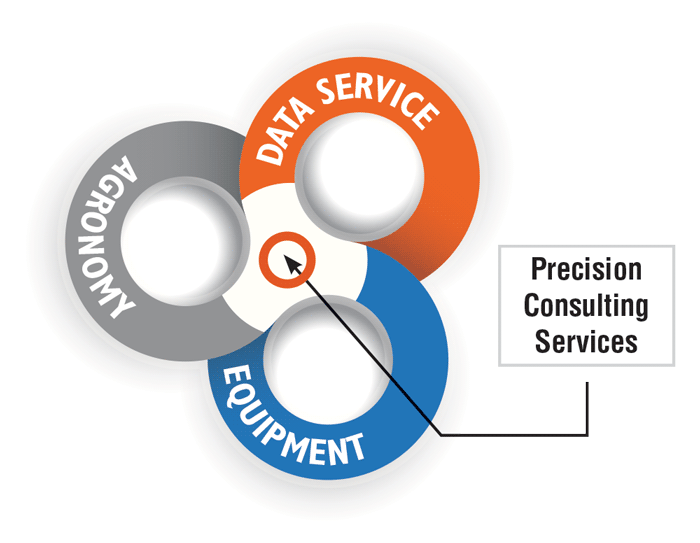
Paul Bruns, owner of Precision Consulting Services, says dealers need to find what their sweet spot in the market is. Precision Consulting Services is able to fill the spot where equipment, agronomy and software and data services all meet. Source: Precision Consulting Services
“There’s a nice little sweet spot in the center that [Precision Consulting Services] falls into. I actually have a agronomy degree from South Dakota State, and have always loved the software, the technology side and being able to view the big picture of how does it all come together.”
Bruns takes a consultant’s approach when working with customers, both with agronomy and equipment. This year, he decided to take a look at what sets his business apart from everyone else. As the technology industry matures, he says, margins are going to erode. So, dealers have to figure out how to differentiate themselves. “How many people can say they sell an auto-steer system? How many vendors are there in the marketplace today? Well, pretty soon when everybody’s got the same thing, it gets down to a price issue. So how are we going to drive value from it?
“All services and products we sell have one purpose — to ultimately make that producer more money. I want to cut his input costs, drive more yield, hopefully make their life simpler, and just increase efficiencies overall,” he says.
When you focus on ROI, price is no longer in the picture, Bruns says. However, he admits selling on ROI isn’t easy. “It’s hard. I will not disagree one bit. Selling based on ROI and agronomy is not as easy because it’s a warm, fuzzy, it’s not just a I got 180 pounds of trip pressure on the seal cultivator. They got 200. Well, does that make their’s better? I don’t know, it depends. Why do I want to buy this widget or service?”
Kaczynski says RDO will often meet with customers and their agronomist or other trusted advisor to make sure all parties are on the same page when it comes to goals and plans for the farmer’s operation. “A lot of times his agronomist doesn’t know about all the latest and greatest stuff out there or opportunity we have with the equipment because it changes so quickly,” he says. “So it’s important that everybody gets on the same page — the agronomist sitting in there along with the account manager and a lot of times our product specialist is there as well. We use that as a team approach. We call it keeping our customers sticky. We’re providing them solutions. We aren’t just viewed as just another tractor dealer, but that we’re coming there with a solution for him.”
Whether the approach you decide on is bringing agronomy in-house and providing it as a service, partnering with agronomists in your area or a combination of the two, communication and planning are key for the integrating agronomy successfully.
Advice From the Co-Op Perspective
While Southern States Co-Op doesn’t sell any hardware or machinery, they are involved in precision farming. Agronomy services account for nearly 50% of total revenues for the 200,000 member co-op. “We’re not on the equipment side, we’re agronomists. But, we work closely with the dealers, both for our applicators and for our salesmen,” says Chris Conway, precision ag coordinator. “Our salesmen need to have the knowledge of downloading rack into combines for the farmer to get going. Not only that, we have a weight wagon and we also help them calibrate their combines at the end of the year because we want good data.”
When it comes to adding agronomic services to your business, Conway says the most important thing is planning. “We need to know what the farmer’s goals are. What does he want to do? What’s his population. We need all that information to keep going,” he says. “If we have data, we like to look at the first, but the most important thing is planning.”
Conway also sits down with the farmer at the end of the year to review the data, what they did and to see if they met those goals and plans. “It’s a good way to start a conversation on what we did right, what we did wrong, what we could have done better. Not only that, but we can overlay stuff vs. why did you do 120 on this side and 150 on this side. So if you’re only going to do 120 why are we feeding the whole field for 150. We want him to start thinking like that,” he says.
This year, Conway says a handful of farmers he works with who bought new precision planters or upgraded their systems because Southern States was able to show them the value. “The value’s an important thing. We did a cost analysis, and automatic row shutoff was a big difference. We figured out most farmers could pay for that in 2 years.”

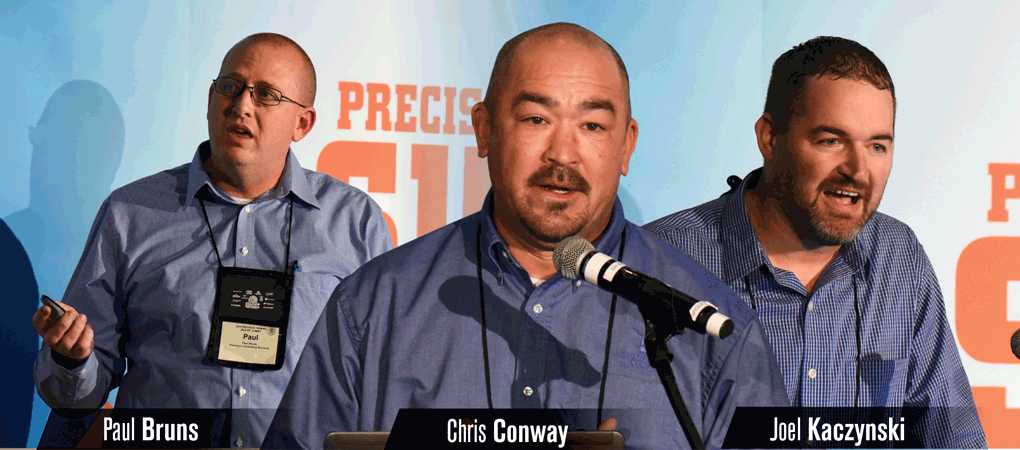
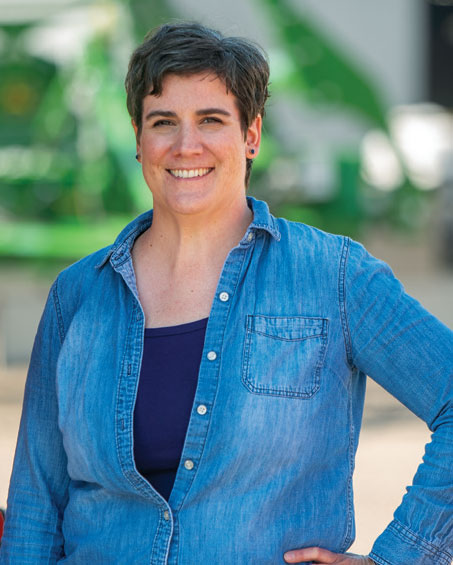

![[Technology Corner] Discussing AI’s Potential Impact on Service & Support](https://www.precisionfarmingdealer.com/ext/resources/2025/04/11/Discussing-AIs-Potential-Impact-on-Service--Support.png?height=290&t=1744385717&width=400)


